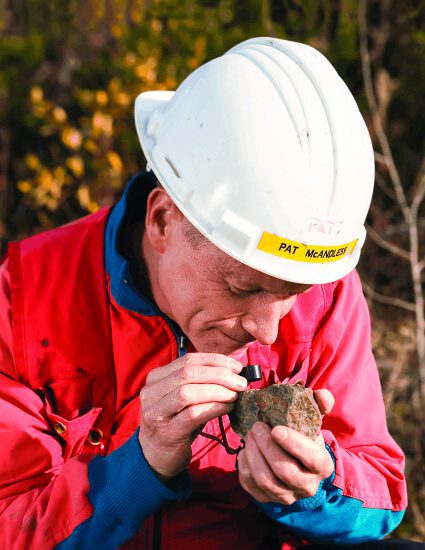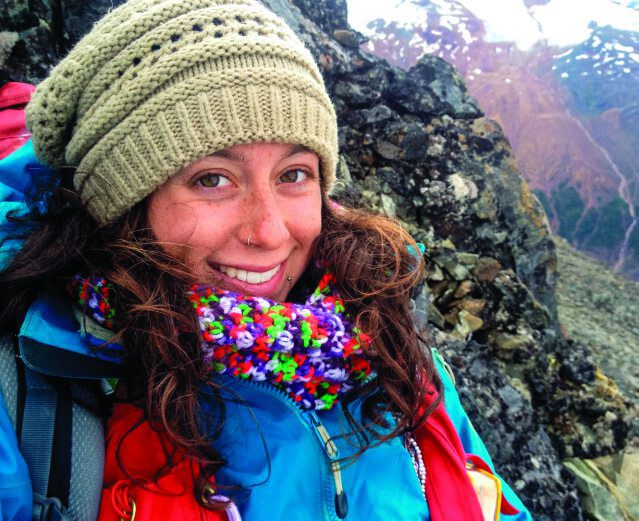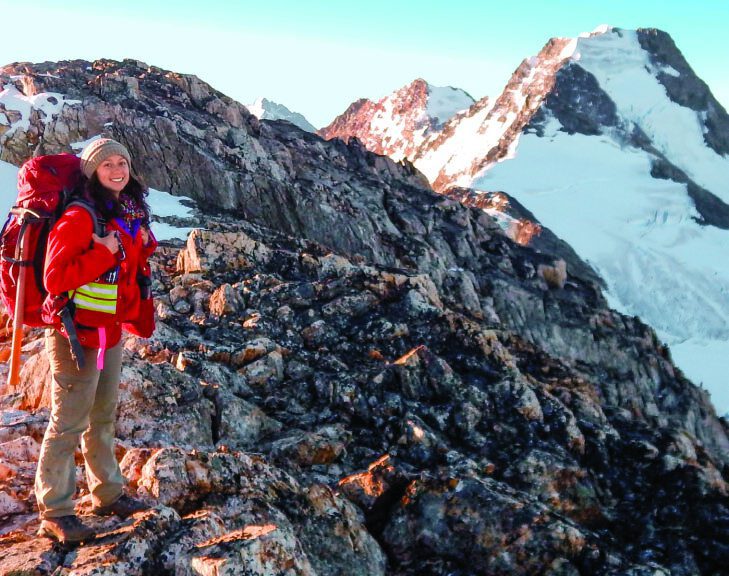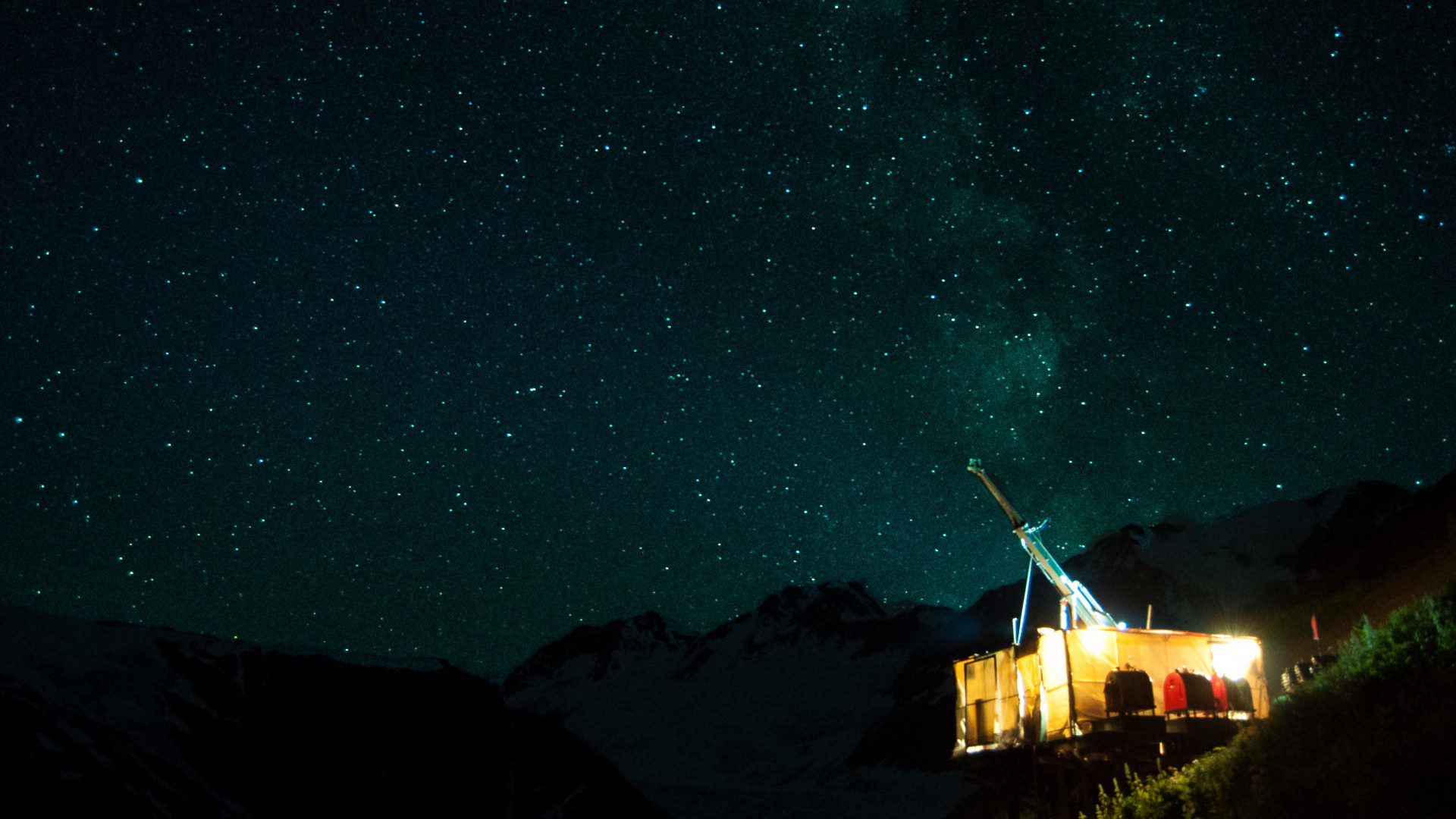
“A field geologist with a broken leg is a bit of a conundrum,” admits Erin Bros.
She broke her leg skiing, right in the middle of job hunting for the summer. The recent Dalhousie University geosciences graduate was on the hunt for field mapping work, a niche that’s hard for non-students to find work in. Add a downturn and that’s three strikes. Yet, Bros never sat down.
“I am extremely stubborn and persistent,” she says. “I am absolutely determined to be a field mapping geologist.” A week after surgery, she crutched her way through the Rock Talk conference in Smithers.
It’s that determination and focus that caught Pat McAndless’s attention. The veteran geologist voluntarily runs a marketing training program for young geologists and students. Bros is one of hundreds who have benefitted from McAndless’s efforts, designed to teach geologists the one thing universities don’t – how to actually get a job.
“Geology students learn a lot about rocks, but they don’t learn what they need to excel in industry,” says McAndless. “Marketing one’s skills is what is missing in our education. I’m trying to fill in the blanks with career development and [provide] students with a set of practical tools to help them transition from academia to a working career.”
Bros is one of McAndless’s star pupils, showing the four “value indicators” that he believes lead to a successful career: passion, a strong work ethic, continuous improvement and persistence. But as Bros has discovered, in today’s industry, marketing skills and a solid mentor go a long way, too.
Bros, now 25, grew up in Ontario. Her parents were both foresters who ran their own business. “I have been very lucky to grow up watching my parents combine their passion with their careers,” she says.

Right after high school, she went to Dalhousie to study earth sciences. At first, her summer tree-planting gig excited her more than rocks. She didn’t think much about a career path and always passed over summer fieldwork in favour of planting. All that changed when, in her final year, she served as president of the geology council and a professor arranged for McAndless to give a talk.
McAndless spent most of his 44-year career exploring for base and precious metals. “I love to find stuff,” he says. And he did, working with junior and senior companies on large-scale exploration projects. As vice-president of exploration at Imperial Metals, he helped discover the copper-gold Northeast zone in British Columbia and the gold 144 zone in Nevada. It was at Imperial that he noticed the gap between school and landing a job.
“I received hundreds of resumés per year, and they all [seemed] to look the same,” he says. At the same time, he had begun mentoring future geologists. “I have always been driven by service to others,” he says. “My concern is the sustainability of geoscience and the mining industry. What better way to address that than to help the next generation?”
Camp life makes geology different from a lot ofr industries. Everyone lives together in a confined and remote place. The intimacy creates an instant family. Bonds are tight and networking happens easily. The first job or two opens the industry. Breaking in is the tricky part, and that’s where McAndless comes in.
In 2011, he was asked to give a talk to master’s students at Oregon State University about Imperial’s projects. Instead, he suggested a speech about the skills he saw lacking in students, titled “How to Have a Successful Career: Getting Discovered.” The students responded with lots of questions. From then on, whenever he visited Imperial’s project sites or travelled to conferences, he offered to speak at nearby universities. He’s spoken at more than 100 universities around the world, all on a volunteer basis.
When he retired in 2014, he took everything he’d been talking about for the past three years and built a website, Geodude Corner. (“A Grade 3 student said to me during a tour of a museum, ‘You must be Geodude.’ That stuck.”) The site is a resource for resumés, business cards and networking strategies that stand out from the crowd. Or, as McAndless likes to say, “Be the purple cow.”
Every geology student has taken roughly the same courses, he explains. What employers want to know about is work ethic and personality. “It’s about showing that you can add value and be a difference maker.”
After hearing McAndless’s talk, Bros was intrigued, and reached out to him for more information.
With the end of her degree came an offer from the Canada-Nunavut Geoscience Office to be a part of its regional mapping program. Working in the field on Baffin Island, she realized that mapping was her passion. Her focus was narrowing, which was a good thing. “We live in a world of specialization,” says McAndless. “To stand out and excel, it is important to become very proficient in a particular aspect of geoscience, so you can carve out a niche and a demand for your skills and expertise.”

After graduating, Bros headed west for the pursuit of big mountain ski-touring and the Cordilleran geology scene. Not sure where to start, but now sure of her path, she turned to McAndless for his mentoring and expertise.
Three people had made big impacts on McAndless’s career: Art Soregaroli, a geologist; Guenter Plassman, a prospector; and Don Coates, a businessman.
“All of them recognized that I was unique and driven to make a difference for others,” McAndless says. “They supported me in my vision and allowed me to grow in a way that fuelled my passion to serve others.”
Now he’s passing on the favour, mentoring students and professionals daily by email, over Skype or FaceTime, and in person.
With Bros, he assigned her books to read and exercises to build her character, hone her vision and help her set goals. While she values it all, it’s mining his 44 years of experience that helps the most.
“Pat takes time to talk to me about anything,” she says. “He has so much knowledge and experience. He lets me bounce ideas off of him. It’s made a big difference.” Particularly when it came to preparing for AME BC’s Mineral Exploration Roundup conference in Vancouver.
“Everyone that’s hiring is there,” says Kendra Johnston, a project geologist with Independence Gold Corp. and the Roundup organizing committee chair. Students are a big focus. The student workshop explains how the industry works. A networking night introduces many of the key employers. And a human resource forum looks at where the industry is and what its staffing needs will be.
“I talked to Pat about Roundup quite a bit,” says Bros. “He helped me understand how to navigate the show, who to meet, what things to stress. This year, I went in knowing exactly who I wanted to talk to.” (See sidebar for tips on preparing for Roundup.)
Bros realizes she’s lucky; she’s comfortable talking to new people and marketing herself. “I know a fantastic geologist who can’t find a job because he can’t sell himself,” she says. “With the downturn, you have to work hard to find work, and I have to work even harder to find mapping work.”
Nothing concrete came out of Roundup. Then she broke her leg skiing. But Bros didn’t give up. She continued to email contacts and talk with McAndless. Finally, she landed a job with the Yukon Geological Survey doing field mapping.
“I’m 100 per cent sure I got the job because of Pat,” she says. “Having someone like Pat say anything positive about me is such an excellent reference.” It’s a reference that came from a lot of hard work.
“Erin is driven to be the best she can be,” says McAndless. “A successful career in geoscience is only a matter of time for her.”
